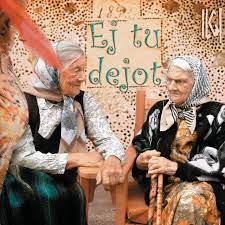 This CD is the latest offering from this energetic and imaginative Latvian folk-rock band. We got everything else they’ve recorded (see my reviews of Kaza Kapa Debesis and Isakas Nakts Dziesmas) and listen to them often and with great pleasure. Ej tu dejot (in English, Go Dance) is probably not the CD I’d suggest if you are new to Ilgi. It is not at all representative of their other work.
This CD is the latest offering from this energetic and imaginative Latvian folk-rock band. We got everything else they’ve recorded (see my reviews of Kaza Kapa Debesis and Isakas Nakts Dziesmas) and listen to them often and with great pleasure. Ej tu dejot (in English, Go Dance) is probably not the CD I’d suggest if you are new to Ilgi. It is not at all representative of their other work.
This CD runs fifty-two minutes long and features a whopping twenty-two tracks, some of which are of necessity very, very short (like ten seconds long). Some of them sound quite traditional, but many do not. All instrumental and varying in rhythm between stately and lively, they leave me with the impression that the band members were trying out some dance or marching tunes but hadn’t quite decided what to do with them. Occasionally they break into pieces that are NOT Latvian at all—on ‘Ackups,’ for example, we caught a bar of ‘What do you do with a drunken sailor.’ What the….?
All five regular members of the band are in attendance, although not necessarily on each track. The most predominant sound on several tracks is Vilnis Strods on drums — and I mean drums played with sticks, not hands. Ilgi founder, mainstay and muse Ilga Reizniece plays her violin, of course — but is very much in the background on many of these pieces. Egons Kronbergs plays guitar, Maris Muktupavela plays accordion, kokles (a plucked string instrument) and dudas (Latvian bagpipe). The sound is rounded out by Gatis Gaujenieks on bass guitar and giga (another Latvian string instrument) — although again, not all artists play on all tracks.
Just to make this all a bit sillier than it already is, a number of the tracks bear very non-traditional names, e.g. ‘pancakes,’ ‘hotcakes,’ ‘crepes,’ flapjacks,’ spacecakes,’ and (last but not least), ‘latkes.’ Did I already say what the…?
The CD case is cardboard and folds out four ways, making for five photos (one behind the CD holder itself) of the band members. There are absolutely no liner notes in English, very few liner notes at all. Anyone read Latvian?
(Biedriba, 2008)
